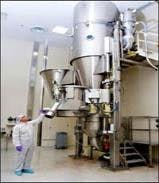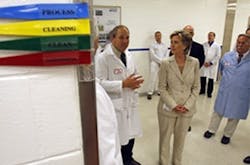Few pharmaceutical sites have as much gravity and history as that in Rouses Point, N.Y. It’s been a manufacturing staple of New York State’s “North Country” for more than seven decades: Ayerst, McKenna & Harrison Ltd. began production with a staff of five in 1934. If the walls of the campus’s 38 buildings could talk.
When Wyeth Pharmaceuticals decided in 2006 to phase out operations in Rouses Point, it mattered. Not just jobs were at stake (then roughly 800 in manufacturing), but careers, history and the social fabric of the community. When Joe Krivulka—former head of Bertek, Inc. (under Mylan Labs) and, later, of Reliant Pharmaceuticals—and partner Leonard Mazur agreed to purchase the facility, their new company, Akrimax, was hailed as somewhat of a white knight.
Wyeth agreed to partner with Akrimax during a two-year transition period—which ends in January of 2010, at which time Akrimax will assume sole control of the site. The arrangement has allowed Wyeth to continue to manufacture Premarin, the estrogen product that has been made in Rouses Point since the 1940’s, and several other key products.
The breadth of capabilities that Akrimax inherits is impressive. It boasts a lab-scale development center for solid oral dosage, semi-solids and liquids; commercial-scale capabilities for tablets and coating, capsules, liquids, creams and ointments; and packaging facilities for bottles, blister packs and tubes. It also can build upon decades of expertise in regulatory matters, tech transfer and scale-up.
Safe at Home
Krivulka and his confidants, however, see the real value of Rouses Point as rooted in its workforce—skilled, knowledgeable, reliable and available. “There was a unique gene pool of people who had worked there for a very long time and were very good at their jobs,” says Alan Rubino, who joined Akrimax as president this past January. “This plant had had no 483’s for as long as anyone could remember.” It has not been uncommon for the regional FDA office to use the Rouses Point facility as a training spot for new inspectors.
Sen. Hillary Clinton, shown here during her recent visit to Rouses Point, is one of those working to save jobs at the facility.
The enterprise has been bolstered by tax incentives and staunch support from Senator Hillary Clinton and former governor, George Pataki. (Sen. Clinton spent four hours at the facility in August 2008, after her presidential campaigning had ended.) Wyeth also deserves credit for guaranteeing what Rubino calls a “graceful” transition. “I can’t say enough about the way that Wyeth invested in and trained these people,” Rubino says. “It allowed us to hit the ground running.”
Akrimax’s commitment to a relatively low-risk workforce has coincided with drug industry wariness about the certainty and cost-effectiveness of outsourcing overseas. Akrimax is betting on the fact that potential partners will increasingly prioritize workforce training and quality issues above the short-term cost advantages of outsourcing abroad (or even to other areas within North America), and that manufacturers selling to the North American market will want a guaranteed secondary supplier on the continent.
Akrimax has been pleasantly surprised that many of the potential partners that have come calling are from Big Pharma, says Rubino. While no formal announcements have been made, Akrimax is in the process of finalizing agreements with some of these manufacturers, he says.
Sen. Clinton gets a tour from Joe Krivulka, Akrimax founder and chairman (left), Leonard Mazur, co-founder and vice chairman, and company president Alan L. Rubino (background).
Ramping Up
Roughly 25% of the entire manufacturing capacity is currently being utilized, Rubino says, but the company’s business model calls for multiple partnerships combined with tech transfer and production of marketed drug products that Akrimax will be in-licensing primarily in the area of metabolic syndrome. “If the heavens are good to us, we’ll maybe have six to ten partners to utilize our capacity, and we’ll still have room to develop our own products,” Rubino says.
Those products will likely not be blockbusters but high potency or mature patent products, depending on market needs. Over time, with modifications to the plant, Akrimax may someday pursue complex biologics, Rubino notes. “We plan to continually home in on very sophisticated and esoteric manufacturing,” he says. “This would allow Akrimax to achieve more premium pricing than would otherwise be possible, as this would become a new area of differentiation and specialization.”
Being viewed as a white knight can be a curse, and Akrimax knows that it will have to prove itself to both partners and the citizens of Rouses Point. Partners will expect the nimbleness and technological savvy expected of leading contract manufacturers—a new ERP system and IT overhaul under way will go a long way toward this end. And the people of Rouses Point will want challenging, stable jobs. “What we have to deal with is the current hope-slash-skepticism continuum of the workforce since Wyeth has recently announced some reductions in staff at Rouses Point,” Rubino says. He believes there will be a renewed momentum and confidence in the plant when employees and residents see new contracts being signed and products moving into the facility.



